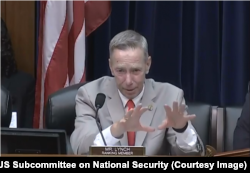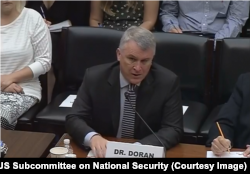A prominent U.S. Republican lawmaker says Iran’s involvement in the Syrian civil war has bolstered a case for the United States to recognize Israel’s annexation of territory in the Golan Heights as buffer to that conflict.
Congressman Ron DeSantis, an ally of President Donald Trump, chaired a discussion about the prospect of such a U.S. recognition at a Tuesday hearing of a House national security subcommittee. Speaking to VOA Persian after the hearing, DeSantis said he heard a “very convincing” case from several witnesses who argued that recognizing Israeli sovereignty in the Golan Heights would advance U.S. and Israeli security interests and push back against those of Syrian President Bashar al-Assad and the Iranian and Russian forces supporting the Syrian leader.
Israel captured the western part of the Golan Heights plateau from Syria in the 1967 Arab-Israeli war and annexed it in 1981 in a move not internationally recognized. For years, Syria has demanded the territory’s return, while the United States has considered it to be Israeli-occupied — a position maintained by the Trump administration. In recent years, Israeli leaders have intensified appeals for the United States to take their side in the dispute.
In his interview, DeSantis said he intends to keep building a public case for U.S. recognition of Israel’s annexation. “The (U.S.) president is somebody who, if he thinks it is the right thing to do, is going to do it,” he said. “So I think it is probably better to try to get executive recognition (by Trump) than to try to work legislation through Congress. We can do a ‘Sense of Congress’ (resolution), but it is not binding on the president.”
WATCH: DeSantis on Israel's annexation
A Sense of Congress resolution is a non-binding document approved concurrently by the House and Senate expressing their opinion about a subject of national interest.
The House subcommittee’s senior Democratic member, Congressman Stephen Lynch, expressed skepticism about a U.S. recognition of Israeli sovereignty in the disputed territory.
“The idea that military conquest transfers rights to ownership – that whoever wins last war has the legitimate right to territory – especially in the Middle East, is a dangerous proposition,” Lynch told the hearing. “I don’t think following that policy leads to a peaceful region or a safe and secure Israel either.”
Four of the five witnesses at the hearing spoke in favor of a U.S. recognition of Israel’s Golan Heights annexation. One of them, Middle East security analyst Michael Doran of the Hudson Institute, said the move would help the United States and its ally Israel to contain Iran, whose leaders repeatedly have called for the destruction of the Jewish state. Iran has been sending troops and militiamen to support Syrian President Assad for years, calling that support part of an “axis of resistance” against Israel.
“If Israel were to withdraw from the Golan Heights, Iranian forces would replace them,” Doran said. “Recognizing reality (by recognizing Israel’s annexation) will deny oxygen to our enemies and strengthen our allies — precisely what a sound foreign policy should seek to achieve.”
Daniel Kurtzer, a Middle Eastern policy studies professor at Princeton University and a former U.S. ambassador to Israel, was the lone contrarian among the witnesses, saying he believes a U.S. recognition of Israel’s Golan Heights annexation would not advance U.S. or Israeli security. He said it would undermine wide international support for Israel’s policies of refusing to take sides in the Syrian civil war while acting militarily against perceived security threats in Syria.
“Changing the subject now to the Golan’s legal status would change the discourse in the region, including among Arab states that are drawing closer to Israel in the face of common threats to their security,” Kurtzer said. “A change in U.S. policy would put the focus on this issue instead of where it belongs – on the murderous actions of the Syrian regime and the support provided to Syria by Iran and Russia.”
In a separate interview with VOA Persian after the hearing, another of the witnesses, former Israeli ambassador to the United Nations Dore Gold, said other parties with interests in the region already have begun discussing the status of the Golan Heights, increasing the urgency for the United States and Israel to do the same.
“When wars finish in the Middle East and the diplomats come in, they start moving borders,” said Gold, who heads the Jerusalem Center for Public Affairs. “And I’m seeing early signs that certain individuals are saying now is the time to deal with the Golan. So we need to put up a diplomatic defensive shield there.”
WATCH: Gold on Golan Heights
Pro-Assad forces have captured some of the last rebel bastions in southern Syria in recent days, raising the possibility that he could defeat the seven-year rebellion against his 18-year autocratic rule.
Gold also said he was not concerned about warnings that a U.S. recognition of Israeli annexation would rupture discreet Israeli relationships with Sunni Arab nations who share the Jewish state’s opposition to Shi'ite Iran’s perceived malign regional activities. Arab nations long have publicly maintained that Israel should withdraw from territories captured in 1967.
“A diplomatic move that strengthens Israel’s position on the Golan and serves as a setback to the axis of resistance that the Iranians are leading would be privately welcomed by the Arab states,” Gold said. “Now, they are not going to come to a (Congressional) committee hearing and suggest that it is a great idea. But when the doors are closed, they won’t drink champagne, but they will drink orange juice, and they will be very happy that it was done.”
This report was produced in collaboration with VOA’s Persian Service.









